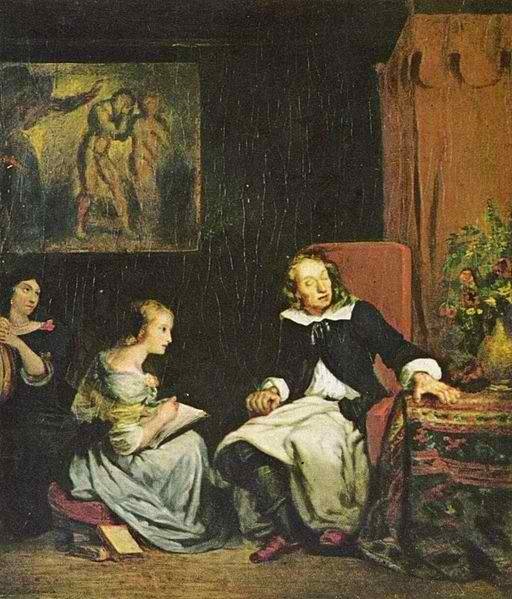
Eugène Delacroix
French, 1798-1863
Milton Dictating Paradise Lost to his Daughters, 1827-1828 ca.
Oil on canvas
31 11/16 x 25 3/8"
Kunsthaus Zürich, Gift of the Canton of Zürich
1988/28
COMMENTS
While Delacroix seems never to have produced a picture inspired by Milton’s poetry and this painting is unique in his oeuvre, Milton was generally admired by the Romantics. He is included with Dante and Shakespeare as a model for the new school of literature in Victor Hugo’s Preface to “Cromwell” of 1827.
Delacroix’s painting is outstanding for its naturalism and sensitive interpretation of the scene without dramatic exaggeration. Milton’s blindness is not only expressed by his unseeing eyes, but also implied in the suggestion of the senses he can still enjoy: touch, by the hand on the rich Turkish carpet covering the table; smell, by the flowers; hearing, by the mandolin held by his daughter. Delacroix conveys by purely pictorial means an idea of the work Milton is dictating, by placing on the wall a picture of the “Expulsion of Adam and Eve from Paradise”, derived from Raphael’s fresco in the Vatican Loggia. According to a note by Robaut, this representation of the Expulsion "is a piece brought into the canvas cut for this effect," but no separate insertion is apparent to the naked eye, nor is this passage visibly later in execution than the rest of the picture.
Lee Johnson, The Paintings of Eugène Delacroix, A Critical Catalog, v. I, Oxford, Clarendon Press, 1981, pp. 123-6
SBMA CURATORIAL LABELS
If the relatively dark palette of this early work is uncharacteristic of Delacroix‘s mature colorism, the subject is typical of the artist‘s Romantic appetite for all things British. This imaginary portrait of Milton, whose "Paradise Lost" is visually signaled through Raphael‘s "Expulsion of Adam and Eve" prominently displayed in the background, was exhibited at the same Salon as the controversial "Death of Sardanapalus." That now revered masterpiece was likewise inspired by a British poet, Delacroix‘s literary Romantic counterpart, Lord Byron (1788-1824).
- Delacroix and the Matter of Finish, 2013
